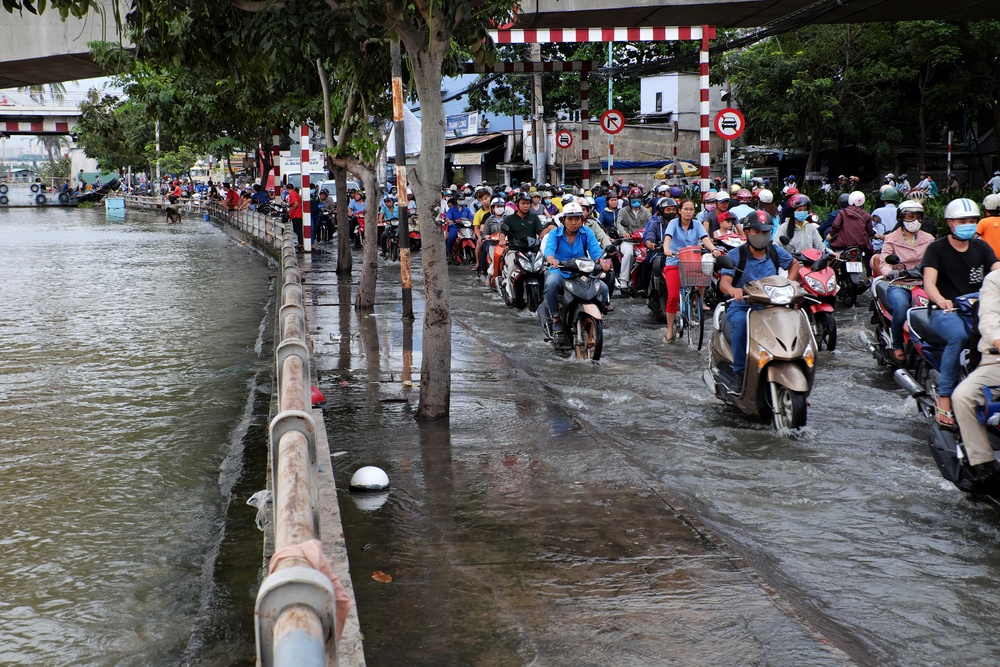Southeast Asia finance sector vulnerable to climate risk, Singapore banks lead on ESG – WWF
Southeast Asia’s finance sector is vulnerable to climate risk and environmental degradation but only four banks fulfill at least half of 70 ESG criteria, says a new study from the World Wide Fund for Nature (WWF).
WWF’s 2019 Sustainable Banking Assessment found that the 35 banks studied in the Association of Southeast Asian Nations (ASEAN) bloc “are not responding fast enough” to sustainability threats.
14 of the 35 banks are in Muslim-majority Indonesia and Malaysia, and all 14 have Islamic banking subsidiaries or business lines.
The 35 banks were assessed based on the level of ESG integration covering six aspects: Purpose, Policies, Processes, People, Products, and Portfolio.
Only four banks in Singapore and Thailand fulfilled at least half of the 70 criteria, while 51 per cent of the banks fulfilled less than a quarter of the criteria.
However, progress has been made since last year as 74 per cent of the banks studied made some improvement, said the conservation organisation.
One of the study’s key findings was that all but two banks refer to sustainability in their strategy, while only four banks do not recognise that their ESG footprint lies beyond their own internal operations.
It highlighted three Singapore banks as leaders. “DBS, OCBC and UOB have demonstrated leadership by prohibiting the financing of new coal-fired power plants and implementing no deforestation commitments.”
BANKS ‘LEAVING MONEY ON THE TABLE’
WWF said ASEAN banks are “leaving money on the table” by not actively supporting the urgently-needed transition to a low carbon and sustainable economy.
“A DBS and UNEPFI (United Nations Environment Programme Finance Initiative) study estimated the demand for green investment to be $3 trillion from 2016 to 2030 in sectors such as infrastructure, renewable energy, energy efficiency, food, agriculture and land use,” said WWF.
“While 51 per cent of banks that offer green financial products have mostly focused on renewable energy, there remains a huge financing gap in the other sectors.”
A key finding was that the banks are not fully leveraging the opportunities related to the transition to sustainable food, energy, infrastructure and transportation systems.
“None of the banks are proactively identifying clients who need support to transition to more sustainable business models,” said the study.
“18 banks have developed green financial products and services for clients, with the majority focusing on renewable energy and green buildings.”
There remains a financing gap in the other sectors, it said.
IMPROVEMENTS NEEDED
The study found that banks’ boards are “not fully activated”, with only 12 assigning ESG responsibility to their boards and two banks incorporating ESG-specific criteria in the terms of reference of nominating, remuneration or audit committees.
It said that high-level leadership statements need to be bolstered by the inclusion of sustainability criteria in board terms of reference.
Banks’ ESG policy frameworks also need to be strengthened with “robust standards” for effective management of E&S risks, it said.
“While the number of banks that have recognised the high risks associated with certain industries and have developed sector-specific requirements has doubled since last year (14 vs 7), only five banks require their clients to commit to international standards and certification schemes such as the IFC Performance Standards and RSPO.”
Overall, ASEAN banks may not be aware of the extent of climate-related risks embedded in their portfolios and do not have a strategy to manage these risks, said the study.
“Only two banks reviewed and disclosed their portfolio exposure to climate-related risks, while two other banks have developed a climate strategy,” it said.
The study highlighted that accountability is key.
“11 banks compared to four last year now report having dedicated ESG teams and 17 banks trained staff on E&S policies and implementation processed, up from 13 last year.
“However, there is limited inclusion of sustainability-related criteria in key performance indicators, with only four banks disclosing such practices, which may result in a lack of accountability for ESG risk management.”
WWF warned that ASEAN’s economies are "very much interdependent, which magnifies the effects of climate change and environmental destruction."
"To ensure that businesses are resilient and the people of ASEAN have a secure future, ASEAN banks need to manage climate and other material environmental risks and opportunities in their portfolios,” said Jeanne Stampe, WWF’s Head of Asia Sustainable Finance, in a statement on Tuesday.
INDONESIA, MALAYSIA
Eight Indonesian and six Malaysian banks were assessed as part of the group of 35.
All 14 have Islamic banking subsidiaries or lines of business, according to Salaam Gateway analysis.
On average, the Indonesian and Malaysian banks performed best on the criteria of Purpose: Sustainability strategy and stakeholder engagement.
They were weakest on Portfolio: ESG risk assessment and mitigation at portfolio level.
The 14 banks on average regressed from last year on Processes: Assessing ESG risks in client and transaction approvals.
© SalaamGateway.com 2019 All Rights Reserved
